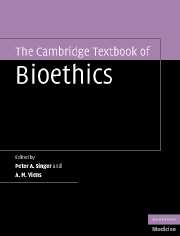Book contents
- Frontmatter
- Contents
- List of contributors
- Acknowledgements
- 1 Introduction
- Section I Information problems
- Section II End of life care
- Section III Pregnant women and children
- Section IV Genetics and biotechnology
- Section V Research ethics
- Section VI Health systems and institutions
- Section VII Using clinical ethics to make an impact in healthcare
- Section VIII Global health ethics
- Section IX Religious and cultural perspectives in bioethics
- Introduction
- 47 Aboriginal bioethics
- 48 Buddhist bioethics
- 49 Chinese bioethics
- 50 Hindu and Sikh bioethics
- 51 Islamic bioethics
- 52 Jehovah's Witness bioethics
- 53 Jewish bioethics
- 54 Protestant bioethics
- 55 Roman Catholic bioethics
- Section X Specialty bioethics
- Index
- References
48 - Buddhist bioethics
Published online by Cambridge University Press: 30 October 2009
- Frontmatter
- Contents
- List of contributors
- Acknowledgements
- 1 Introduction
- Section I Information problems
- Section II End of life care
- Section III Pregnant women and children
- Section IV Genetics and biotechnology
- Section V Research ethics
- Section VI Health systems and institutions
- Section VII Using clinical ethics to make an impact in healthcare
- Section VIII Global health ethics
- Section IX Religious and cultural perspectives in bioethics
- Introduction
- 47 Aboriginal bioethics
- 48 Buddhist bioethics
- 49 Chinese bioethics
- 50 Hindu and Sikh bioethics
- 51 Islamic bioethics
- 52 Jehovah's Witness bioethics
- 53 Jewish bioethics
- 54 Protestant bioethics
- 55 Roman Catholic bioethics
- Section X Specialty bioethics
- Index
- References
Summary
Mrs. B is aged 35 and lives in a remote part of the Chiang Mai region of northern Thailand. She is an agricultural worker with only a basic education. She does not use contraception because there is no local family planning facilities. She is married with three children, and has just found out she is eight weeks' pregnant. She and her husband barely earn enough to support their existing children, and a fourth child would place an unbearable economic strain on family resources.
The Venerable C, a Burmese monk resident in the USA, suffered a severe stroke at the age of 59. He had a history of diabetes, poorly controlled high blood pressure, atrial fibrillation, congestive heart failure, and chronic obstructive pulmonary disease. He had undergone a cardiac bypass operation several years earlier. The prognosis was guarded at best, even with surgery. The attending neurosurgeon asked whether Venerable C would want emergency surgery or if he would prefer to forgo aggressive measures. The monk had not discussed his wishes previously with his fellow monks or students, had made no advance directives, and remained unconscious throughout (Hood, 2005).
What is Buddhist bioethics?
Buddhism is a body of religious teachings attributed to an historical individual called Siddhartha Gautama, who lived in northeast India in the fifth century BCE. Following a profound spiritual transformation at the age of 35, he became known by the honorific title of “Buddha” (“enlightened one”).
- Type
- Chapter
- Information
- The Cambridge Textbook of Bioethics , pp. 391 - 396Publisher: Cambridge University PressPrint publication year: 2008



